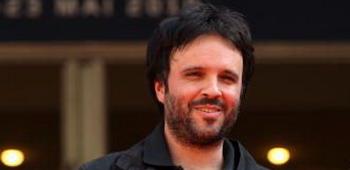
Am 14. Oktober startete der peruanische Film ‘Im Oktober werden Wunder wahr’ in den deutschen Kinos. Dieser beschäftigt sich mit dem Leben eines Pfandleihers inmitten des Monats Oktober im peruanischen Lima, wo dieser als ‘lila Monat’ gilt. In einer Prozession durch die Straßen der Stadt wird der Herr der Wunder verehrt. Das Brüderpaar Daniel und Diego Vega haben nach ihrem Kurzfilm ‘Interior Bajo Izquierda’ mit ‘Octubre’, so der Originaltitel, ihren ersten Langspielfilm inszeniert. filmtogo hatte die Möglichkeit sich mit dem jüngeren Bruder Diego Vega über den Film zu unterhalten.
filmtogo: Your film opened in Germany on October 14th. Early in October it started in Peru. How was the response in your home country?
Vega: We have released the film a week ago on Thursday. It’s going okay. It’s going well. We have past the second week with all the theaters. We released ten copies. In some theaters we were like in four screenings. Now we are in two. Besides the numbers and the quantity of people, they like the film. They enjoy it and have a good time while watching the film. That’s the important thing.
filmtogo: How did you react when it was announced that your film won in the ‘Un Certain Regard’ category at Cannes?
Vega: Well, we won the Jury Price. We were very excited because we didn’t think about winning, not even about going to Cannes. Going there was really enough for us. But when suddenly your name is said during the ceremony, you’re like „What?“. That is very strange. I went there to receive the recognition. Just at that time my phone was ringing because the news were released some minutes before to the press. So in Peru my mother knew already about it. So she was calling me. It was a shocking moment. Nobody expected it at that time.
filmtogo: This is your first feature film. You did one short film before. How did you became a filmmaker at all?
Vega: Well, it took me a while. I studied economy and I worked. My brother was studying audiovisual communication. He once brought a camera to the house. It was a weekend. We were just about to go away, to go out and have some beer or something. But we decided to shoot a short film. Just to enjoy because we thought it was fun. I remember that day having a lot, a lot, really a lot of fun. Anyhow, I just kept studying and working. And I was not fit in so well. I always remembered that day. It was really a joyful day. I like films very much, just watching them. And since I was young I liked to write, too. So I just said „Okay, let’s move to something else“. And I quit. One day I just woke up and I quit my job. I made a test and went to study films in Cuba.
filmtogo: Did you get some inspiration for your film? Some other filmmakers or films perhaps? Is there any influence in your film?
Vega: Yeah, some a obvious. There is Bresson and maybe also Jarmusch. And there is some argentinian and uruguayan films. The one is called ‘Whiskey’. The other one, the argentinian one, is called ‘El Otro’. It’s basically not because of the visual but because of the acting of the people. The actors just are quite unexpressive and the energies are very low. But they can tell you a lot with less, with few things, with simple things. I think for this film we had mainly this as a reference. But that doesn’t mean that we’re gonna continuing doing films just like that. Maybe the next film needs something completely different than this one.
filmtogo: You just spoke about actors. Your film is not only your first feature film, it is also the first feature film for a lot of the main actors. They’re coming from theater or television. Why did you cast these kind of actors?
Vega: Well, in Peru we don’t have something like a star system. You have actors who can bring you some people to the theater. But in case of the main actors we were looking for faces and attitudes that make you think about the characters we had created in the script. The three main characters were just very easy decisions. For example the main character. He was the teacher of my brother. My brother studied acting for one year. And when we were writing the script he said that maybe his teacher can help us. He was just the way we were picturing our pawnbroker. So he showed me his teacher and I said „Yes, he is the one“. So we delivered the script and just started to talk. Then the lady was also like that and we worked before with Don Fico, the old man, in our short film. So we talked to him and we told him that we wanted to work with him also for the feature film. We were just looking for faces, no matter if they were not big actors. They know very well how to act and they’re very workable.
filmtogo: From actors to directors. How is it like to work with two directors on a movie set? Do you share your work? Especially with your big brother. Was there everything in harmony or did you have arguments with your brother sometimes?
Vega: There were a couple of difficult moments during shooting. But we divide our work. Daniel takes care of the camera. He just concentrates on the frame and how it’s gonna be. I am with the actors. Before that we talked a lot. We saw films, we talked with the actors, we read the script together, take notes, we discussed everything. When shooting begins everything is clear and each of us is taking care of one part. But sometimes it has happened that I told something to an actor. Then I just went to see something else and my brother had some impulse and said something completely different to the actor. These things happens. But since we talk a lot, we can manage to solve these small conflicts.
filmtogo: And you’re not really on the same page with your brother regarding the ending of the film. He thinks it’s a bad ending, for you it’s more of a good ending, isn’t it? What is it really?
Vega: My brother has been saying this. I don’t know why. I think he said that just to make fun. Because he is quite a romantic. He is more romantic than I am. What we had in mind was just a matter of saying anything. The thing is, we were pretty much sure that we wanted a open ending with a big sensation of hope.
filmtogo: The month of october has a special meaning to the film. Could you explain the whole tradition behind the ‘purple month’ in Peru?
Vega: Well, it’s a very old and religious tradition that has its origin in Lima. Around 350 years ago a black slave from Angola painted the image of a black christ on a wall. That is why it is called ‘El Christo Moreno’, like the black christ. And this wall resisted, especially two very big earthquakes a long time ago. And the people started to venerate, to think that this wall has some special powers. So that becomes to what it is. A massive devotion to an image.
Das Interview führte Denis Sasse


